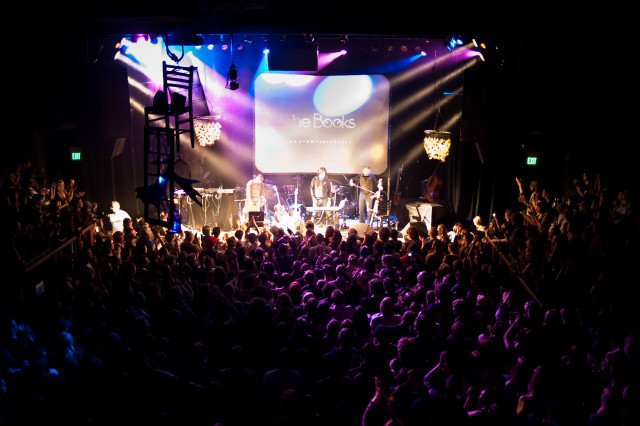
As Communikey approaches its fifth year as a festival and its eighth year as an organization, founder, creative and managing director Kate Lesta is in disbelief over how the electronic music scene has changed in the past decade.
“When we started, we were the only ones in town doing this [putting on electronic music concerts],” Lesta says. “Now dubstep is pop music.”
But as pop music shifts to accomodate the creeping influence of dubstep and other forms of electronic dance music, the Communikey organization and its festival are themselves morphing with the times. Lesta and company are rebranding the festival this year. Gone is the “Communikey Festival of Electronic Arts,” replaced with simply “Communikey Festival,” happening April 25-29 in various venues around Boulder.
“We started bringing artists that didn’t really fit into that category [of electronic arts],” says Matt Krall, project manager and marketing director for the festival, explaining the name change.
The first festival focused on techno music and lacked the “spectrum” of music and events found at this year’s
festival, Lesta says. Now the festival offers films, bands, workshops and more, and festival organizers are starting to book some big fish too: On the bill this year is Laurie Anderson, distinguished standard-bearer of the New York City avant-garde scene.
Anderson has always made work that defies classification. Such is the case with the performance art piece she’ll perform on Wednesday, April 25 at the Boulder Theater as part of the CMKY festival. “Dirtday!” is the third installation of a trio of story performances that she’s put on, and this one has a bit of everything.
“It moves back and forth between politics, kind of some ideas about evolution and dreams, and then sort of general reporting stuff,” Anderson tells Boulder Weekly. “I’ve been going around and visiting tent cities and checking them out, and there are a lot of them. … I just sort of reported on some time I spent in one of the places.”
Anderson says that these days more than any thing, politics motivates her work.
“A lot of what this country is about is sort of being shredded, in my opinion,” she says. “I really don’t understand why there aren’t just mass riots.”
She praised the Occupy movement for trying to effect some sort of change.
“I was part of the student movement in the late ’60s early ’70s, and we were extremely snobbish,” she says. “We were like, ‘We know what the real scene is, and the rest of you are just dupes of the system.’ We had our own music, our own food, our own culture, and we were very exclusive. It was about excluding people. Occupy is about redefining the whole thing, saying actually it’s about everyone.”
Anderson’s way of distilling this in “Dirtday!” will include spoken word, electronics, projections, music and more. Her experimental storytelling fits in perfectly for the festival’s mission.
“What we realized is that we’re interested in music that is challenging and adventurous, and on the edge, on the fringe. It’s not necessarily about electronic music,” Lesta says. “We’re really interested in cultivating a space where people can connect in an unfiltered way.”
One connection that happened early on in the festival was between Lesta and Turkish LED artist Deniz Kurtel. Kurtel is an LED artist and DJ whose music bridges house and techno. She will perform live at the Bitter Bar on April 25, and she will also bring an LED installation, housed in a 6-foot-by-12-foot trailer, called “The Introspectacular.”
Kurtel took an unlikely path to becoming an electronic music producer. While in New York, working on a pair of master’s degrees in policy analysis and quantitative methods from New York University and Columbia University, Kurtel became friends with Zev Eisenberg from the house-hip-hop DJ duo Wolf Lamb, and she started making LED installations for Eisenberg’s shows and parties.
Lesta met Kurtel while visiting New York, and she commissioned an installation for what would be the first Communikey Festival.
“We brought her here for the first festival. It was her first commission, and she didn’t really know how to do it yet,” Lesta says. “She didn’t know how to take her art outside her own studio, outside of controlled environments. I think it was a really big learning experience for her, and I think it was a catalyst for her for figuring out how she wanted to execute her vision. And in the time since, she’s become an internationally renowned techno producer.”
Kurtel is grateful for the experience, saying it helped her realize her ambitions as an artist.
“The most important part of it was Kate Lesta, who was the first person who commissioned me for a large-scale project,” Kurtel says. “She kind of gave me the courage to kind of take it further and provided me with a lot of material that I was able to keep and keep using in further projects and stuff.
“That was one of the main objectives doing this road tour. I’ve been wanting to thank her in a way and go back and visit her, and this was a very good opportunity to pass by Boulder and participate in this festival again.”
That’s what a somewhat underground festival like Communikey can accomplish. By refusing to take corporate sponsorships (which is one of the festival’s core tenets), the festival must take a chance on local and unknown-to-lesser known artists. And sometimes those artists make the most out of those opportunities.
“It feels good to be seeing [CMKY artists succeed], starting to be able to see the effect of that,” Lesta says. “It’s very intentional. We know that we have the capacity to offer that. If that’s happening, then we’re doing our job right.”
Respond: [email protected]














